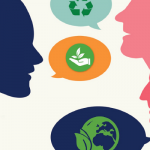Let’s talk about sustainability
April 25, undergraduate students, graduate students and staff members from UW Tacoma’s Center for Equity and Inclusion had an open talk about sustainability. Participants came from a range of backgrounds such as information technology, nursing and environmental studies. This was part of the Real Talk series that the Center hosts multiple times throughout the quarter. Each Real Talk session is an hour-long open forum where all staff, faculty and students are invited to come together to discuss a topic.
Social justice program coordinator, Robert Tacker, led the discussion. He started by telling the group about his background in environmental activism, but emphasized that this was an event for every voice to be heard.
“The way this works is that I’m not a lecturer and I’m not an expert,” Tacker said. “This is more so to foster communication and to listen to everyone’s ideas.”
The direction of the Real Talk was left open to those in the room. Topics ranged from simple actions that can be taken like using reusable bottles and shopping bags, to topics related to sustainable forests, ecological diversity and environmental justice.
“I wanted to frame this as simple as talking about using reusable containers,” Tacker said. “You are free. This discussion is about you [students, staff and faculty] talking about anything related to sustainability — all the way up to windmills and solar panels or all the way down to something as simple as reusable bags.”
While some of the ideas were spoken about on broad terms, it was often brought down to the local level. The repercussions of Tacoma’s former smelter business, the cleaning up of Commencement Bay, the saliency of environmental issues amongst West Coast versus East Coast residents and rural versus urban residents, and the availability of recycling and compost options were all brought up as part of the discussion.
Throughout the conversations, the future of the planet was brought into question. Participants thought about what they could do to help, whether their efforts would matter and who would bring about change. They discussed petitioning, policy, legislation and awareness in the United States and abroad.
One of the attendees was Aramis Zigta, an environmental studies major.
“I really think we need to put policy into place and that’s where we need to start — talking to our legislatures and signing petitions,” Zigta said.
As a group, they wondered how the United States could move forward and begin to prevent, mitigate and stop environmental issues from arising. Some wondered if millennials and gen-Xers were going to be the next ones to bring about change. Some cited examples of citizen action amongst these generations such as the #MeToo movement and involvement in gay marriage and gun control rights.
“I see the youth today doing things, simple things like #MeToo. It is a really radical and constructive concept,” Tacker said. “Just something as simple as a hashtag really focused in on an issue and literally changed a culture. I see youth as the ones that are going to take care of the problem, the ones who are going to actually address this. It might take 20 years for them get into being the leaders of power where they can actually do this, but they give me more hope than anything else I’ve seen in the last 30 or 40 years.”
The group also talked about how new tools for exposure such as social media and smartphones could make a difference.
“I think the creative use of media and this collective sense of ‘we have had enough’ that I see in youth movements, I really do believe they are our last best hope,” Tacker said.
One of the final topics discussed was campus involvement. Participants brought up the lack of people on campus that show up to events, like the Earth Day Fair that had taken place a couple of weeks prior to this talk. Is there not enough advertising for events ahead of time? Why were students not getting involved? Some thought that it was because of the large percentage of students who commute to campus or the lack of student free time, interest, incentive and motivation.
“I probably talked to 10 or 12 different students [in my geology class] and asked their major throughout the quarter and they all said environmental science, environmental studies or sustainability. I don’t see much of that representation on campus,” Zigta said. “I don’t think there are enough extracurricular activities because students feel like they need to get their degree, do what they need to do, but other than that they are not responsible for positive change.”





